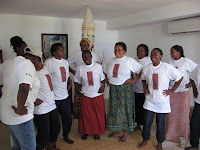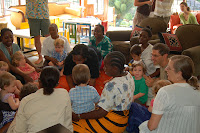And not having those can create a real longing. So the ex-pats in Dar dig into celebrating holidays in ways they might not as fully at home. Yes it is 90 degrees, and yes, your shirt is plastered to you and the frames on your glasses can leave little red burn marks on your temples. And if you are three years old, you can have an ongoing heat rash that makes you look like a pimply adolescent. But damnit, it’s Christmas and we’re gonna do it right. Sort of like the old Avis commercial, ”we are sweaty, so we try harder.”
Our friend
 Marion, who is German, invited us to celebrate Martinstag with her. St. Martin’s is a big day in Germany. Apparently, Martin was in the Roman army in 300 A.D. One snowy winter evening, Martin and the other soldiers were returning on horseback to Amiens. A beggar sat at the city gate, so cold in his ragged clothing that he could not even ask for help. Martin did not have any money or food to give him, so he cut in half his heavy red soldier’s cloak and gave him half.
Marion, who is German, invited us to celebrate Martinstag with her. St. Martin’s is a big day in Germany. Apparently, Martin was in the Roman army in 300 A.D. One snowy winter evening, Martin and the other soldiers were returning on horseback to Amiens. A beggar sat at the city gate, so cold in his ragged clothing that he could not even ask for help. Martin did not have any money or food to give him, so he cut in half his heavy red soldier’s cloak and gave him half.That’s the story. He got to be a saint for giving half a coat. Half! I imagine him, with a New York Jewish accent, “what, a little bit of the lining will keep you warm. Ok, for you my friend…”
The Germans traditionally celebrate with Gluewein, meatballs, and other foods, lots of carol singing, and a lantern parade.
Marion had about eight families over to celebrate. Some families were more clued in than others on the lantern front. I had plopped a candle into a tin cup and tied a wire to it for Bodie to carry. Other families showed up with elaborately decorated paper lanterns. I was heartened a little when Clare showed up with two tea candles tied to string hanging from a stick. Although both of ours efforts completely missed the point, at least I wasn’t going to send my kid up in flames.
Marion anticipated the fact that a few of us didn’t quite get it and had paper, glue, candles, and art supplies ready. Quickly fashioning more appropriate lanterns, we set out after dusk to march the dusty streets of Dar for our lantern parade.
Lanterns bobbed in the dark as we paraded down the dirt streets, singing Christmas songs. It must have been a sight as people stopped to watch a bunch of mzungus walking with lanterns singing Jingle Bells. It was quite beautiful. Each kid treated his or her lantern with reverence. Which is to say, Bodie didn’t immediately turn his into a flying “bopper”, as seems to be his instinct now.
On Saturday, the Yacht Club held a kids holiday party. The party had clowns (I guess no elf outfits exist in Tanzania.) organized games, crafts and music.
The big event was of course Santa. Parents who wanted to could drop off a present ahead of time and Santa would
 pass them out.
pass them out.After a few hours of games, music, and organizers wearing thin in the 90-degree heat. A signal was given for Santa. The entrance was dramatic. And slow. Santa was apparently at sea and would be arriving via boat, so all the kids lined the stone wall over the harbor and flocked down to the pier.
Choruses of Santa Santa Santa rang out. Organizers were on their walkie-talkies behind us yelling, “I don’t care. Get Santa here NOW!” Families waited. Each boat that came into sight elicited cheers. Women in bathing suits, out for an afternoon sail had never felt so appreciated.
An interminable half hour later, Santa appeared in the distance on a large catamaran, which slowly approached the pier. The tide was low and the catamaran drew too much water to get to shore, so a dingy was dispatched for the final leg.
Santa finally made a glorious entrance. Wearing the full red suit, belt, hat and beard in the late afternoon heat, Santa tried to plow through the gift giving. Over 100 wrapped presents were piled by his chair. With the fans going, the beard in his mouth, and the combination of accents – Tanzanian, South African, English, American -- kids would tune out or not recognize their names, torturing the wilting Santa.
On Sunday, Hillary, inspired by local crafts, woke Bodie and I early to make ornaments. We walked around the yard, gathering sticks, large fallen pods, and interesting leaves. We crafted ornaments, painting sticks, tying together small twigs, and fashioning pods to wires. And then we baked ginger cookies. Really. We mixed and kneaded cookie dough with cinnamon, nutmeg and ginger. I couldn’t find real cookie cutters, so we used Bodie’s Play-Dough cutters and have a wonderful assortment of duck, tree, car, bunny, and dog holiday cookies.
We still have two Hanukah parties to attend and two more Christmas parties.
We, like other ex-pats here, are masterfully channeling the longing to be home with family into some over the top holiday-making.












